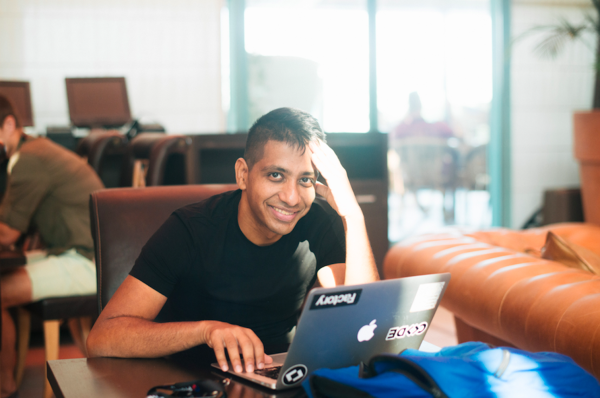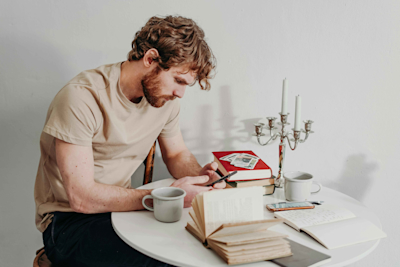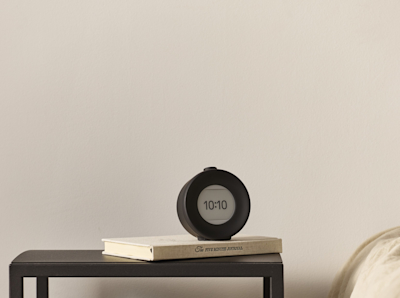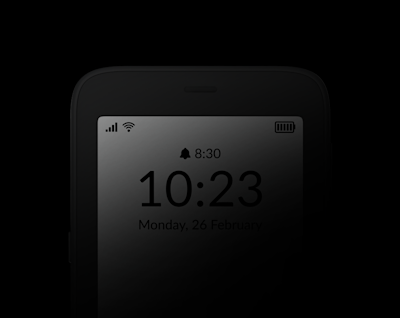
An Entrepreneur Who Lives Without a Smartphone
When smartphones first appeared, people rushed to get a better alternative for their dumb phones. They were choosing nicer design solutions, larger screens and smart functions that feature phones didn’t have, such as the multi touch screen replacing plastic buttons.
Since then smartphones have developed even more but the number of buyers has stopped growing as rapidly. Furthermore, a new trend has appeared: switching back to feature phones.
You might have noticed that even entrepreneurs and celebrities such as Ed Sheeran and Simon Cowell have started to get rid of their smartphones, changing multifunctional devices to simpler, safer ones.
We were wondering what made them do that so we decided to conduct a few interviews in order to figure it out. One of the entrepreneurs Rudradeb Mitra kindly agreed to share his experience living without a smartphone with us.
Just in the past year and half, Rudradeb has spoken at 40 events in 14 countries and traveled to over 20 countries. And all without having a smartphone. In past he had built 6 startups in 4 countries.
He is also an author of the book titled ‘Creating Value with Artificial Intelligence’. He spends some time mentoring too – he is a Product mentor at Google Launchpad, Founders Institute and a senior AI advisor of EFMA banking group.
Q1: Which electronic devices do you use in everyday life?
I own a laptop and a kindle. Sometimes, when I have to, I use my feature phone for bank operations.
Q2: You don’t use a smartphone? Why?
The first time I thought of getting rid of my smartphone is when I lost my 4th phone in a year. . But there was always a part in me, which felt that smartphones makes our life more complicated. You see I follow Zen teachings and am a minimalist. So it was not that hard a decision to make.
Q3: Now you have a feature phone, you finally decided to buy at least some form of mobile?
First I shifted from a smartphone to no phone. For six months, I didn’t have any and it could’ve lasted longer, as I was perfectly fine. But the problem came when I was traveling. Normally I used to carry cash but at times had to do transfer for unforeseen events.
So in a way bank forced me to have a phone, although I find it ridiculous but I still have to follow their rules and regulations. I even went to the bank and I was trying to explain that I don’t have a mobile. They couldn’t understand the concept of someone not having a phone.
Q4: You say lived for six months without a mobile phone. Can you briefly describe how this experience was for you?
I became a lot more mindful. I was not distracted and my efficiency improved a lot. When I was talking to people I was present and I became an even a better listener, though I was always a good one (laughter).
My memory improved as I have to memorize maps. I also started coming up with different ideas. For example, when I’m taking a tram I’m not looking at my phone but observing the surroundings and as my mind is free some new thoughts come up. Also, although I’m already a very relaxed person, without a mobile my life became even calmer. I didn’t have to check messages and emails when I’m on the go, as I simply knew there was no way I could do that.
I even wrote an article about the topic "My life without a phone: Mindful, Happy and full of ideas".
Q5: What do others think about your decision to live without a smartphone?
The first reaction was surprisingly enthusiastic. Most of them said: “Wow that’s great! I hope one day I could also have no phone.” I pondered why most of the people wishing not to have a smartphone had one but I then realized they are somehow forced to own one.
Actually it’s true about many things in life. Many people hate what they have yet they somehow continue having it.
Q6: What was the best change that happened to you when you replaced your smartphone with a feature phone?
Not much. As you see I first moved from smartphone to no phone and then to feature phone. So moving from no phone to feature phone did not change much for me, except made my life easier when transferring money from abroad (laugh). The single biggest change that I have noticed is that I am much more present and conscious. In everything I do! I work better, I dance better, the food I eat tastes better, I listen to others better, I feel better and I am able to build more meaningful relationships.
Q7: Do you face any obstacles by not having a smartphone?
Yes, there are many of them. One good example is something as simple as ordering an Uber. For example, The Uber cars in Ukraine or India or Vietnam, unlike in Western Europe or the US, don’t often come to the spot where you order it.
Once I was on the fifth floor in a conference hall and I ordered an Uber (via laptop), I saw the car coming, so I went down to the place where it should have arrived but there was no car. I waited for five minutes and had to return back to the fifth floor as only there I had an internet connection. I went up and saw that the Uber was waiting somewhere else rather than in the spot it was supposed to be. Then I went down again, to that other location but the guy had already cancelled. This happened no less than four times and it took me 40 minutes before I finally got one.
Other obstacles I face are a lack of Google maps, so I have to memorize maps instead. Translations could be way easier with a smartphone too as you can translate with text, voice or images. In real life, you need to practice the language and really think about what you’re saying.
I do get lost sometimes. Especially in countries where I couldn’t read the street signs and couldn’t understand the language.
A week ago I was in a residential area of Krakow searching for my airbnb flat. I could not remember the map well and was worried I had to go back to a place with internet connection (the nearest one i knew was 15 mins away) I was thinking what to do and then I met a half-drunk guy. Normally I would never talk to him as for sure he does not speak English but I had no other option and asked him if he knew the address.
He asked me to follow him and after walking for 5 minutes, he showed me the place. And yes, it was indeed that address. During the 5 minute walk, he was all the time talking to me in Polish – of course I didn’t understood a single word but that did not deter him. It was a strange but memorable experience. And I believe life is all about these beautiful experiences, so you can see not having a smartphone lead to a such experience. That’s a great side of not having a smartphone.
In another country something similar happened. I was in the conference afterparty. I asked if someone could drop me at my place. One guy have agreed. Not only he dropped me at my place but afterwards he showed me the city, walking in the streets till 1 am.
An entrepreneur giving a speech in front of a crowd at a conference
Q8: How do you mostly communicate with people and get invited to speak? Do you have any social media accounts?
Usually, I use Gmail and Skype if I’m having a call. In terms of social media I mostly use LinkedIn, sometimes Facebook but I have fake account so I don’t use it much anyway (laughter). I normally check social media a few times a day on my laptop, so I don’t need a smartphone for that.
Q9: Aren’t you required to respond to emails fast when you’re working?
No, I don’t have to. I found out that there is nothing that is ASAP. I’ve realized the majority of us have a constant need to feel important which drives people to constantly check their emails, as they think they must have received something.
If you don’t have a smartphone and you don’t check your email inbox for a day, you realize that nothing stops for you in this world, which is also a very humbling experience. We think we’re important but actually none of us are. The idea that we need to keep checking our emails or replying immediately makes no sense. I spend a lot of my time thinking, reading, coming up with new ideas etc. and you can do it well when you don’t have that constant distractions from a mobile phone.
Q10: What do you think about the impact social media has on its users? There are several studies which say that spending too much time on social media can lead to anxiety and depression.
I’m not an expert on these things but I think social media is not the cause, its is just a mean. The cause is somewhere else. Why do people have to be on social media? Why do they want to get so many likes or follows?
I think it’s due to a lack of confidence, they look for gratification and confirmation. Even if social media is removed I don’t think it would drastically change the insecurities people have. Social media is an enabler and definitely makes people act in certain unhealthy ways. Mostly, we have internal problems that we are trying to solve externally using Facebook, Instagram or Twitter, which won’t work.
Q11: How do you think this problem can be solved?
I follow Buddhism and I do daily meditation. I think the answers to the question is inside us, which is to find inner peace and not look for confirmation from outside
Q12: Returning back to the smartphone topic, do you believe mobile phones emit radiation that it might have a harmful effect on our body and mind?
I don’t believe in all this research and I try not to pay much attention to it. I think sometimes we over analyze these things. I’m persuaded that the key is to be happy today and if my mobile phone is making me unhappy I will get rid of it, regardless as to whether or not the cause is radiation, distractions or something else.
Q13: To summarize, do you think mobile phones help us or have more of a negative impact?
Personally, I love technology and I think it can be used in both good or bad ways. It’s up to us to decide how we use it and whether we let it take control of our lives.
Once I was in India and I was watching people on the tram having a video call with their families that are living in remote villages. If I’m not mistaken, 4G internet connection in India is one of the fastest and the most widespread in the world. I think it’s wonderful that those people can be in constant contact with their families who they see rarely.
Q14: What advice would you give to anyone thinking about getting rid of their phone but haven’t done it yet?
I think it’s very simple, like any other decision in life: Don’t think, just do it. The bottom line is that we all know what we want. We play mind games without reminders and start over-thinking. You already know what the right decision is.
Do you also have a great story of living without smartphone that you would like to share? Perhaps you remember a time before smartphones? If you’re interested in sharing your experiences with us or writing a guest post for us, send us an email via hello@mudita.com!
Please feel free to get in touch via social media (send us some photos or videos too), you can find us on Facebook, Twitter and Instagram, let’s connect! To learn more about Mudita, take a look at our website and our other posts.
If you enjoyed reading this article, please share and recommend it!
Related stories

Is Short-Form Video Hurting Your Focus?
New research shows short-form video may weaken attention. Explore how mindful tools and Mudita Kompakt support healthier digital habits.

Master Your Mornings: 7 Things to Do Before Bed
Discover 7 evening habits that transform your mornings & unlock the secrets to peaceful, productive days with Mudita's mindful tech.

First glimpse of Mudita Kompakt
Mudita Kompakt is Mudita's upcoming minimalist phone with an E-Ink touchscreen, designed for simplicity and reducing digital noise.
If you'd like to receive the best stories from our blog, keep up to date with our progress and get notified about our product releases and special discounts.